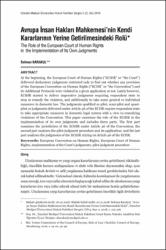Avrupa İnsan Hakları Mahkemesi’nin kendi kararlarının yerine getirilmesindeki rolü
Künye
Karakul, S. (2018). Avrupa İnsan Hakları Mahkemesi’nin kendi kararlarının yerine getirilmesindeki rolü. İstanbul Medipol Üniversitesi Hukuk Fakültesi Dergisi, 5(2), 125-156.Özet
Avrupa İnsan Hakları Mahkemesi (AİHM veya Mahkeme) ilk dönemlerinde yalnızca Avrupa İnsan Hakları Sözleşmesi (AİHS veya Sözleşme) ve Ek Protokol hükümlerinin somut başvuruda ihlal edilip edilmediğinin belirlenmesiyle sınırlı olarak tespit kararları vermiştir. Ancak AİHM son zamanlarda, davalı devletin ihlali sonlandırması veya telâfi etmesi, ayrıca iç hukukta genel veya özel nitelikte birtakım tedbirler almasını gerektiren emredici nitelikte kararlar vermeye başlamıştır. Pilot, yarı pilot veya pilot benzeri olarak nitelendirilen kararlar ile AİHS’nin 46. maddesine dayanarak verilen diğer kararlar, AİHM’nin tespit ettiği Sözleşme’ye aykırılıkların davalı devlet tarafından iç hukukta giderilmesini gerektirmektedir. AİHM’nin, kendi kararlarının yerine getirilmesindeki rolünü ele alan bu çalışma üç bölümden oluşmaktadır. Birinci bölümde, AİHS’nin 46. maddesi kapsamında AİHM’nin yetkileri, ikinci bölümde, pilot karar usulü ve uygulaması incelenmekte, son bölümde ise AİHM’nin, AİHS’nin 46. maddesine dayanarak verdiği kararlar değerlendirilmektedir. At the beginning, the European Court of Human Rights (“ECtHR” or “the Court”) delivered declaratory judgments restricted only to find out whether any provision of the European Convention on Human Rights (“ECHR” or “the Convention”) and its Additional Protocols were violated in a given application or not. Lately however, ECtHR started to deliver imperative judgments requiring respondent state to stop or remedy the violation, and additionally to take some general or individual measures in domestic law. The judgments qualified as pilot, semi-pilot and quasipilot or judgments delivered under Article 46 of the ECHR require respondent state to take appropriate measures in domestic legal system with a view to remedying violations of the Convention. This paper examines the role of the ECtHR in the implementation of its own judgments and includes three parts. The first part examines the jurisdiction of the ECtHR under Article 46 of the Convention; the second part explores the pilot-judgment procedure and its application; and the last part analyses the judgments of the ECtHR relying on Article 46 of the ECHR.
Kaynak
İstanbul Medipol Üniversitesi Hukuk Fakültesi DergisiCilt
5Sayı
2Koleksiyonlar
- Makale Koleksiyonu [116]
- TR-Dizin İndeksli Yayınlar Koleksiyonu [2179]


















